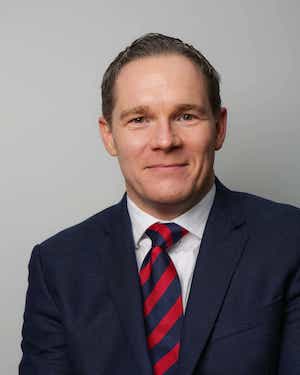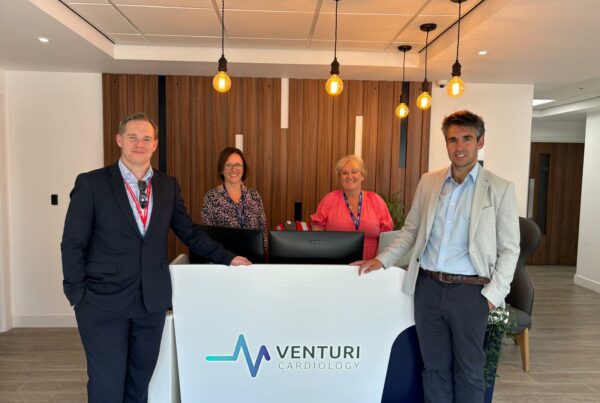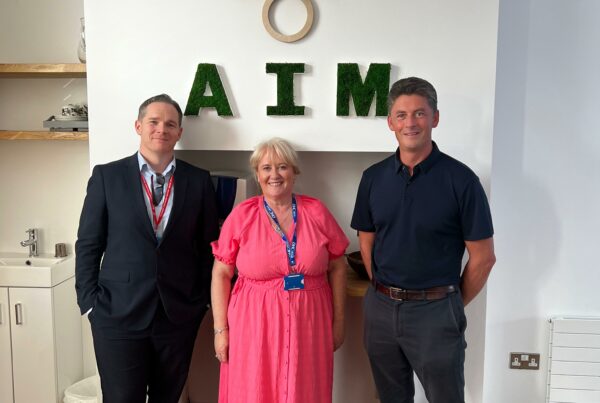In a world with limitless opinions and expert advice, why should you listen to us?
If we have learnt anything from the Covid-19 pandemic of 2020/21 it is the importance of listening to experts. Experts readied our hospitals, advised and taught us how to protect ourselves, and created not one, but three effective vaccines.
When someone has dedicated their life to becoming an expert in the causes and treatment of a disease, it makes sense to listen to them.
Dr Scott Murray was five years old when his Grandfather died suddenly of a heart attack. Witnessing the heart-breaking consequences of this tragedy prompted a fascination with heart health, which has culminated in Dr Murray becoming one of the UK’s leading experts in cardiology.

In terms of fatality, he couldn’t have put his energy in a better place: the statistics are sobering.
Heart disease is not contagious in the same way Covid-19 has proved to be, but it is certainly as deadly. Heart and circulatory disease account for over one quarter of all deaths in the United Kingdom: one death every three minutes. Forty-four thousand people under the age of 75 will die from heart disease every year and the North West has one of the highest rates in the country. Coronary Heart disease kills one in every seven men and one in every 12 women.
And yet, many of us don’t give our heart health a second thought. The heart goes on beating more than 70,000 times a day, keeping us alive, and we don’t stop to consider how healthy it is or if it is under undue strain. In most cases we only start thinking about the health of our heart when it begins to fail, or someone close to us suffers a heart attack, as was the case for Dr Scott Murray.
Scott trained in interventional cardiology and also gained a Doctor of Medicine title from the University of Liverpool for his work on heart plaques. After taking up his consultant cardiologist post, for many years if you suffered a heart attack in Liverpool, it was Dr Murray’s phone that would ring. His team performed procedures around the clock, placing stents, allowing blood to flow and carry oxygen to the heart, saving and prolonging life. However it soon became apparent to Scott that interventional cardiology was not enough: it wasn’t working on the root causes.
What is happening inside your body when you are suffering from heart disease?
For those whose hearts are in bad shape, interventional cardiology is only the first step on the long road to recovery. Post procedure, to ensure you don’t suffer continued consequences of heart disease, it is necessary to undertake a process of life-changing rehabilitation. If we think of the patient as a boat on the ocean, the intervention stops the patient from continuing on their dangerous course, possibly to complete heart failure and loss of life. To ensure the long term recovery, it is necessary not just to stop the boat but to turn the boat around and sail in the opposite direction. This is not easily or quickly done. To understand why, it is necessary to begin by looking at the reasons why the heart may have failed in the first place.
In the simplest terms: the heart is not inexhaustible and although it can and does try and repair the wear and tear it takes, like any other part of the body there is a point at which the heart function fails, when the strain becomes too great for it to continue functioning.
Strain on the heart increases as inflamed deposits (plaque) build up over time, narrowing the heart’s arteries, putting strain on the heart to pump oxygenated blood around the body, a process called atherosclerosis. Atherosclerosis can start at a young age, gradually increasing until by the time you reach middle age, it may be quite advanced. This process is known as Coronary Heart Disease (CHD). When a plaque eventually ruptures, a blood clot forms, blocking a coronary artery, causing a heart attack.
So, that is what is happening inside the body, but what is being done outside the body to cause this threat to increase?
One of the most often cited causes of heart disease is poor diet and lack of exercise. When we are inactive and eat overly processed and energy dense foods, the body struggles to safely break down the fats and sugars. This can lead to metabolic derangements and inflammation which contribute to the plaque deposits. Smoking, high blood pressure and excessive alcohol consumption exacerbate this process, creating yet more plaque and putting the heart arteries under increased pressure.
For these patients, if they suffer a heart attack and recover, the process of rehabilitation can be very difficult. For the heart arteries to have failed to the extent the patient sees the inside of a hospital, the build-up of disease will be quite advanced. Then the patient leaves hospital and returns to their home environment. In many cases the environment which created a culture where the unhealthy lifestyle originated, where excessive alcohol, smoking, an unhealthy diet and lack of exercise are the norm. For many of these patients, to successfully embark on a strict programme of rehabilitation, with a food and exercise plan, can feel almost impossible.
Realising the limitations of the rehabilitation programme that was on offer, Dr Murray has been active in trying to establish greater funding and a greater national focus on rehabilitation and pre-habilitation, to enable patients to have the best chance of success.
Alongside these causes of heart disease which, although incredibly difficult to reverse, a patient ultimately has control over, there are other factors which patients who are often entirely oblivious to and cannot control. Inherited genetic conditions can contribute to the likelihood of heart disease. Even in someone who appears fit and healthy, the heart can be under great strain without the patient knowing.
Recent studies have also show endurance athletes, those who run marathons and take part in triathlons and iron man competitions, may also be at elevated risk. It is possible someone may look healthy and even undertake a vigorous programme of exercise; and unbeknownst to them still have a heart that is struggling to cope. These people may feel well and have few symptoms and yet silently be developing the perfect conditions for a heart attack.
Misdiagnosis
The diagnostic risk tools currently in use are unfortunately blunt instruments unable to, with clarity, ascertain the degree of damage the heart may have already suffered. GPs keen to prevent heart attacks often err on the side of caution and prescribe a course of treatment (such as aspirin and statins) if someone presents with a few of the risk factors (ordinarily obesity, high blood pressure and shortness of breath). However, alternative measures (support to improve diet and exercise and to stop smoking) could on occasion be far more effective (and cheaper for the NHS). Patient motivation is the key factor here.
At present, there are 740,000 people in the UK living with undiagnosed type two diabetes. One third of all adults with diabetes will die from heart or circulatory disease. This means there are nearly 250,000 people unaware they are at risk because of undiagnosed diabetes. In addition between six and eight million people in the UK live with undiagnosed or uncontrolled high blood pressure. And of course there are many who have an increased likelihood of contracting heart disease through hereditary conditions they are unaware of. For these people, if they wait until they suffer a heart attack to discover their heart is diseased, it may well be too late.
Knowing this, Dr Scott Murray, after a lifetime of learning and practising first interventional cardiology and then preventative and rehabilitation cardiology, now believes the future of heart health must lie in preventative cardiology. Scott believes that to combat the problem of heart disease and bring the number of fatalities down it is essential that heart disease is spotted earlier. In his own words, “In my job I see people every day who, if they had received a CT scan five years before, could have been treated or potentially may have been given that push to really change their lifestyle and turn things around.” It is clear that with heart disease, prevention really is better than cure.
New diagnostic tests can change everything
In Spring 2021, Dr Murray and his team are opening Venturi Cardiology: Your Heart; Your Health, a preventative cardiology clinic. Here, the team of specialists will provide state-of-the-art scans and diagnostic tools to provide an accurate indication of heart health. Moreover, the team at Venturi clinic will then work with patients to devise a detailed heart health recovery plan. The cutting edge diagnostic and rehabilitation techniques used at Venturi are world class and will save lives. One example of these new diagnostic tests is the calcium score test.
The Calcium Score Test
Prior to a patient experiencing physical symptoms the heart will often have experienced numerous asymptomatic heart events. These occur when plaque ruptures through the artery lining causing a tear and partial blockage. The heart heals this rupture, and part of this process involves calcium deposits in the damaged artery. Numerous (potentially silent) heart events over time result in build-up in the arteries making them less flexible and less able to manage future strain. The more calcium deposited in the heart’s arteries, the greater the calcium score. The greater the calcium score the more evidence there is of heart disease and the more likely a patient is to suffer a future heart attack.
The calcium score test is a non-invasive and accurate early-warning diagnostic tool able to reveal a hidden disposition, which may otherwise have gone unnoticed.
The ability to diagnose early increases the possibility a patient can take measures to improve the health of their heart and decrease the likelihood of future heart attacks.
This is just one of the screening and diagnostic tests on offer at Venturi, an independent clinic aiming to give patients the answers they need quickly.
Venturi is also looking to collaborate with the NHS to offer its services through GPs and hospitals, ensuring that GPs can refer higher risk patients on to them. The strain the global coronavirus pandemic has put on NHS waiting times is reaching crisis point. With long waiting lists making access to NHS services difficult, Venturi hopes that its offering will help ease this burden whilst giving patients the care and support they need, without the price tag of a private hospital.
Up to 90% of heart disease is preventable. Dr Murray and the team at Venturi cardiology want to help you keep your heart healthy, giving you the support to be part of that coveted 90%.
To register your interest and be the first to receive opening offers and more great content click here.












